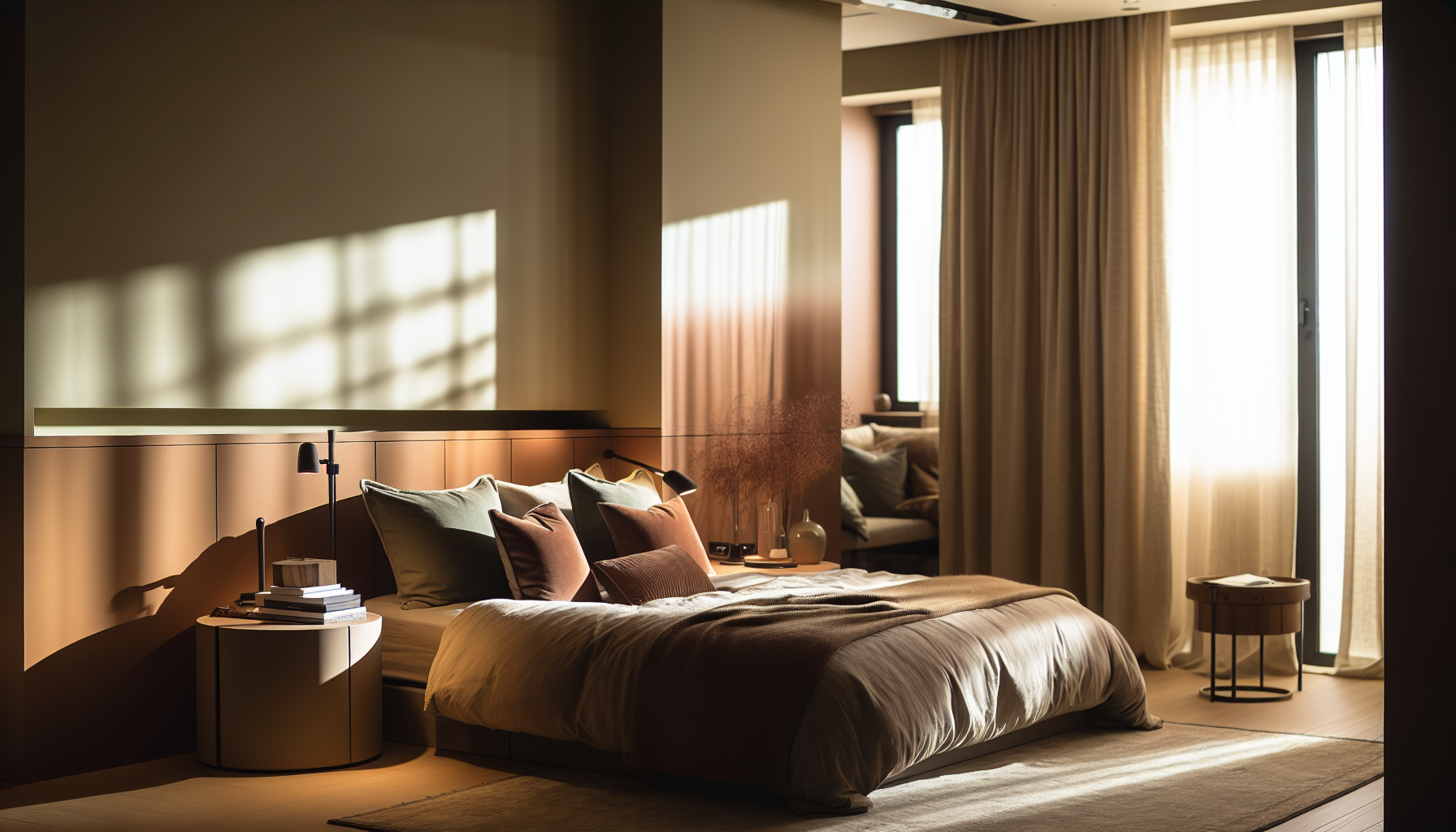Sleep Help Strategies: 10 Proven Methods for Enhanced Rest
Need sleep help? In this article, you’ll find ten targeted strategies to transform your sleep. From perfecting your environment to refining routines, uncover the steps you can take tonight for a restful slumber.
Key Takeaways
-
Establish a regular sleep schedule by going to bed and waking up at the same time every day, including weekends, to align with your body’s circadian rhythms and enhance sleep quality.
-
Optimize your sleep environment by keeping the room temperature between 60 and 68°F (16-18°C) and reducing exposure to blue light before bed to facilitate natural sleep onset and improve restfulness.
-
Practice pre-sleep rituals such as listening to soothing music, engaging in relaxation techniques, or using meditation practices to signal your body to wind down and prepare for a restorative night’s sleep.
Understanding Sleep Challenges

Sleep challenges, such as trouble sleeping, can arise from a myriad of factors, including stress, anxiety, and poor sleep habits. These elements can significantly impact your sleep quality, making it difficult for you to fall asleep and stay asleep. Now, consider this - have you ever noticed that your anxiety levels seem to increase when you’re experiencing trouble falling asleep? This is because there’s a close link between sleep debt and anxiety, creating a cycle that can wreak havoc on your overall well-being.
Rest assured, gaining insight into these challenges paves the way for their resolution. By recognizing the effects of stress and anxiety on your sleep, you can start implementing strategies to break the negative cycle. It’s time to reclaim your good night’s sleep and improve your sleep quality.
Establishing a Restorative Sleep Schedule
Ever wondered why you feel groggy when you sleep in on weekends? Irregular sleep schedules can throw off your body’s internal clock, leading to poor sleep quality and daytime fatigue. The key to better sleep lies in establishing a consistent sleep schedule. This involves setting a regular bedtime and wake-up time, aligned with your body’s natural circadian rhythms.
Next, we’ll examine the science behind determining sleep time and modifying weekend sleep patterns, both of which greatly affect sleep quality.
Setting Your Sleep Time
Finding the perfect bedtime may feel like a complex task, but it doesn’t have to be. By tuning into your body’s needs and using tools like a sleep calculator, you can determine your ideal bedtime and wake-up time. This personalized approach considers factors such as your age and lifestyle preferences, empowering you to achieve a better night’s sleep and optimal health.
You may question, what is the optimal amount of sleep for adults to maximize their health and vigor? The answer is seven or more hours of sleep every night. This helps you wake up feeling refreshed and ready to take on the day, warding off sleep deprivation.
Adjusting Weekend Sleep Patterns
Weekends can often disrupt your sleep schedule due to late nights and sleeping in. However, maintaining a consistent sleep routine, including weekends, is crucial for healthy sleep. It helps keep your body’s internal clock in sync, reducing the risk of “social jetlag” - the feeling of tiredness and disorientation that occurs when your sleep schedule is inconsistent.
Adhering to consistent wake and bedtime schedules, even on weekends, can boost both your mental and physical health, guaranteeing a refreshed feeling upon waking. So, resist the urge to hit the snooze button on weekends and stick to your sleep routine for better sleep quality.
Optimizing Your Sleep Environment

Your sleep environment plays a significant role in how well you sleep. Two critical factors to consider are the temperature of your room and the impact of light. Did you know that the optimal temperature for sleep is between 60 and 72 degrees Fahrenheit (15.6 and 22.2 degrees Celsius)? Maintaining this temperature range can improve your sleep quality.
Now, consider the impact of light. Exposure to natural light during the day can boost your sleep-wake cycle, while minimizing exposure to artificial light at night can help ensure a restful night’s sleep. We’ll further investigate these elements.
The Ideal Room Temperature
The temperature of your room can significantly impact your sleep quality. Maintaining an optimal temperature of 60-68°F (16-18°C) helps facilitate the body’s natural temperature drop associated with sleep onset, leading to more restful sleep.
Not only does this temperature range promote a good night’s sleep, but it also contributes to a higher amount of deep sleep, which is essential for achieving restorative sleep. Plus, it can significantly benefit individuals with sleep disorders, preventing disruptions in the body’s natural temperature reduction.
The Impact of Light
Just as room temperature can impact your sleep, so can light exposure. Bright or artificial light at night can disrupt sleep and hinder the transition between sleep cycles. On the other hand, exposing yourself to natural light during the day can power up your body’s sleep-wake cycle and elevate the quality of your sleep.
But what about the type of light? Warm colors like red or amber can create a calming environment for a restful night, while blue light from electronic devices can disrupt your ability to fall asleep. So, dim those lights and switch off your devices for a better night’s sleep.
Embracing Pre-Sleep Rituals

Consider the influence of rituals. Pre-sleep rituals can signal to your body and mind that it’s time to wind down and prepare for restful sleep. Some examples of pre-sleep rituals include:
-
Listening to soothing music
-
Practicing relaxation techniques
-
Taking a warm bath
-
Reading a book
-
Writing in a journal
Incorporating these healthy sleep habits into your bedtime routine can help promote better sleep.
From the soothing sounds of nature to the calming effects of deep breathing exercises, these rituals can greatly enhance your sleep quality. We’ll discuss how the incorporation of soothing music and relaxation techniques can revolutionize your bedtime routine.
Soothing Music and Sounds
The power of music and sound should not be underestimated when it comes to sleep. Soothing music can:
-
Calm the autonomic nervous system
-
Lead to slower breathing
-
Lower heart rate
-
Reduce blood pressure
Achieving a better night’s sleep can significantly improve your sleep quality and help you fall asleep faster, which is why we’re here to help you fall asleep.
But what types of music and sounds are most effective? Instrumental melodies, classical music, and nature sounds can all create a relaxing atmosphere that promotes better sleep. Even the frequency of the sound can have an effect. For instance, sound frequencies like 432 Hz music and white noise can enhance your sleep quality.
Relaxation Techniques
Relaxation techniques are another effective way to improve your sleep. These can include breathing exercises, progressive muscle relaxation, and visualization techniques, all of which can reduce stress hormones, slow your heart rate, and calm your body and mind for restful sleep.
As for the duration, a 15 to 20-minute session before bedtime can enhance your sleep quality. So, why not give it a try tonight and see how these techniques can transform your pre-sleep routine?
Nourishment and Nighttime Sleep

The food you eat can also have a significant impact on your sleep. Certain foods are known to promote better sleep, while others can disrupt your sleep patterns. For instance, foods high in fiber and low in saturated fat can promote restorative deep sleep, while certain foods close to bedtime can have a negative impact on your sleep quality.
Let’s delve into more detail by examining certain sleep-promoting foods and the ideal timing for your last meal.
Foods That Promote Sleep
Certain foods are known to enhance sleep quality. These include milk, fatty fish, tart cherry juice, and kiwifruit, all of which have been shown to promote better sleep. Other helpful nutrients and components for sleep include melatonin, Omega-3 Fatty Acids, Tryptophan, B Complex Vitamins, and Magnesium.
Interestingly, tryptophan, an essential amino acid found in many protein-rich foods, can help induce sleepiness and improve sleep efficiency. This is because it’s converted into serotonin, which is then transformed into melatonin, the hormone essential for regulating sleep and circadian rhythms.
Timing Your Last Meal
The timing of your last meal can also impact your sleep quality. It’s recommended to have your last meal about three hours before bedtime to ensure better digestion and a more restful sleep. Eating close to bedtime can disrupt your sleep by causing gastrointestinal discomfort, heartburn, and reflux.
Furthermore, consuming lighter, healthier meals closer to bedtime can positively impact your REM sleep, enhancing your overall sleep quality.
Physical Activity and Sleep Hygiene

Physical activity can greatly enhance your sleep hygiene. Regular exercise can help:
-
Solve sleep-related problems
-
Ensure you get enough rest
-
Reduce stress
-
Reset your circadian clock
-
Lessen symptoms of sleep disorders
-
Boost your overall sleep quality
However, it’s also important to avoid vigorous physical activities close to bedtime. These can overly stimulate the nervous system and raise the heart rate, making it harder to fall asleep. So, aim to finish your workout sessions at least a few hours before bedtime to ensure a restful night’s sleep.
Mindfulness and Mental Health
Mindfulness and mental health are closely linked to sleep quality. By practicing mindfulness, you can reduce stress, anxiety, and depression symptoms, leading to improved sleep. Meditation practices such as guided meditation and mindfulness meditation can further promote relaxation and ease your mind into a restful state.
You might wonder how to integrate mindfulness into your daily routine. We’ll further discuss this and investigate some effective meditation practices.
Meditation Practices
Meditation can be a powerful tool for improving sleep, and can even serve as a natural sleep medicine. Practices like the 4-7-8 breathing technique can significantly reduce anxiety and promote relaxation, making it easier for you to drift into a peaceful sleep.
Furthermore, mindfulness meditation, which involves concentrating on breathing and present moment awareness, is particularly effective for enhancing sleep quality and addressing insomnia. Therefore, allocate 15 to 20 minutes before bedtime to these practices, fostering a tranquil mental state favorable for restful sleep.
Addressing Sleep Disruptions
Sleep disruptions can significantly impact your sleep quality. These disruptions can be caused by a variety of internal and external factors, from stress and anxiety to environmental influences and physical disturbances.
By recognizing these disruptions and their causes, you can implement strategies to minimize their impact on your sleep. This can include:
-
Adopting a healthy diet
-
Engaging in regular exercise
-
Improving sleep hygiene
-
Creating a sleep-conducive environment
When to Seek Professional Sleep Help
Sometimes, despite our best efforts, sleep problems can persist. If your sleep problems continue for more than 4 weeks or interfere with your daily life, it may be time to seek professional help. Sleep specialists can diagnose and treat potential sleep disorders, helping you regain control of your sleep and improve your daily functioning.
Keep in mind, tackling persistent sleep issues can lead to substantial improvements in daily life, including heightened focus, mood uplift, and elevated cognitive function. So, don’t hesitate to reach out to a professional if you need help.
Leveraging Sleep Aids and Supplements
Sleep aids and supplements can also be helpful in improving sleep. For instance, CBD, melatonin supplements and valerian root can help regulate the sleep-wake cycle and enhance the quality of sleep. However, it’s important to consult a healthcare professional before starting any new supplement regimen to ensure your safety and avoid potential interactions with other medications.
Keep in mind, sleep requirements vary individually, and a strategy effective for one person might not be as successful for another. So, always listen to your body and make the necessary adjustments to ensure you’re getting the best possible sleep.
Summary
In conclusion, achieving a good night’s sleep involves a combination of factors, from maintaining a consistent sleep schedule and creating a conducive sleep environment to embracing pre-sleep rituals and making the right dietary choices. It’s also essential to address any sleep disruptions promptly and seek professional help when necessary.
Remember, your journey to better sleep is just that - a journey. It might take time and require some trial and error, but with patience and persistence, restful nights and energized days can become your new norm. So, here’s to better sleep and a healthier, happier you!
Frequently Asked Questions
What to do when struggling to sleep?
To improve your sleep, try going to bed and waking up at the same time every day, relaxing before bedtime, ensuring your bedroom is conducive to sleep, and exercising regularly during the day. Establishing a routine and creating a comfortable sleeping environment can help you fall asleep more easily and get better rest.
What is the 10 3 2 1 0 rule for sleep?
The 10 3 2 1 0 rule for sleep involves cutting off caffeine 10 hours before bed, food and alcohol 3 hours before bed, work 2 hours before bed, and screen time 1 hour before bed. Following this routine can help improve the quality of your sleep and ensure you wake up feeling refreshed.
Why am I so tired but can't sleep?
It's possible that your tiredness but inability to sleep could be related to a vitamin deficiency, poor sleep due to a sleep disorder, stress, anxiety, depression, room temperature, or an irregular circadian rhythm. It's important to address these potential factors to improve your sleep quality and overall well-being.
How can I fall asleep fast with insomnia?
To fall asleep fast with insomnia, create a consistent sleep routine, keep the lights off, avoid napping during the day, exercise, avoid using electronic devices, and try mindfulness or meditation. It's also important to relax and unwind, and create the right sleep environment (sleep hygiene), and considering improving sleep through diet and exercise for better results.
How can I improve my sleep hygiene?
To improve your sleep hygiene, consider maintaining a consistent sleep schedule, optimizing your sleep environment, and embracing pre-sleep rituals. These factors can help you achieve better sleep quality and overall well-being. Additionally, making the right dietary choices can also contribute to better sleep. By following these recommendations, you can improve your sleep hygiene and enjoy a more restful night's sleep.
